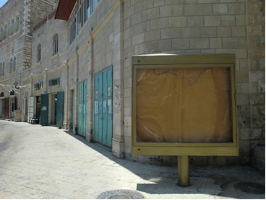It has become more and more clear that peace talks are not going to happen anytime soon. Both Netanyahu and Abbas claim to want to negotiate for peace, but the status quo remains. (For more on that, see Steve Weisman’s previous post Twiddling Fingers.) In that case, the only thing that remains is for each side to do as they please based on their own goals, and in turn for the other side to decry said action as preventing peace talks. There is no question that both sides are guilty of doing this, but a more nuanced analysis is required when the situation is divided between oppressor and oppressed, between powerful and powerless, between accepted and rejected.
Let’s start with the most obvious example: settlement expansion. Israel continues to build settlements, and faces the criticism that this shows it is not truly interested in a two-state solution. Israel, as the occupying force, has the choice whether to continue building settlements or not to. Palestine, as the occupied body, has the choice to resist violently or non-violently (or not to resist at all). There is an obvious hierarchy here, one in which Palestinian action depends on Israeli abuse of power.
In an effort both to assert their own authority and rebalance the scales, Palestinians have turned to the international community for help. Most recently, Palestine made use of its new membership in UNESCO to inscribe Bethlehem as a site of World Heritage. Naturally, both Israel and the US condemned this action. They claimed that this effort was politically motivated, and that the emergency procedure that was used was inappropriate for the situation. I have one question only, before I fall into the same trap: How is it possible that the United States, one of the most Christian countries in the world, voted against placing the birthplace of Jesus on the list of world heritage sites? For political reasons, of course.
I would like to break down the issue of Bethlehem to make my point. Why did Palestine make this particular bid, and why did Israel oppose it? And in terms of the bigger picture, what does this particular example say about Israeli-Palestinian relations?
The day before the UNESCO vote, I went on a journalists’ trip to Bethlehem. The first half of the day was a tour, walking along part of the Patriarch’s Route to the Church of the Nativity. The second half was a Q&A session with Omar Awadallah of the Palestinian Foreign Ministry and Bethlehem Deputy Mayor George Saade regarding the UNESCO bid. The tour, led by expert George Rishmawi, mostly focused on the dying tourism in Bethlehem. Surrounded by abandoned shops, Rishmawi lamented the lack of true pilgrimages to Bethlehem and noted that 90% of its tourism is controlled by Israel. In terms of the UNESCO vote, he called it significant because “labels do make a difference” and this submission would get Bethlehem back onto the tourist agenda.

At the Q&A, the focus was mainly about Bethlehem’s cultural right to be included as a recognized site of World Heritage. There was a hint here or there about Israeli damage to the Church of the Nativity during the Second Intifada, and the need for additional funds to fix the church’s leaky ceiling. For a short time, the topic of discussion was the Pilgrimage Route (which leads from the Old City in Jerusalem to the Church of the Nativity in Bethlehem) where a Christmas parade takes place every year. The Pilgrimage Route was included in the World Heritage list.

There was one thing that wasn’t talked about, but was included in an information packet: the fact that Israel has plans for a settlement that would effectively cut off Bethlehem from Jerusalem entirely, and disrupt the Pilgrimage Route. The reason that this wasn’t talked about was because it was stated very clearly at the meeting that “it’s not a political issue, it’s a cultural issue”.

Once that has been made clear, it’s obvious why Israel so adamantly opposed this bid. Israel’s official position for being against Palestine being a member state in the UN or its institutions is that statehood has to come from peace negotiations rather than a unilateral effort. What’s really happening here is that Israel fears being undermined by the international community in its own unilateral effort to avoid a two-state solution.
To get all the facts straight: Palestine submitted an emergency bid to preserve its cultural heritage (and maintain sovereignty of land under PA jurisdiction). Israel opposed this bid because the emergency procedure was inappropriate (and to preserve the settlement enterprise). Let’s hope that one of these days the dancing will stop and we may see some honest, straightforward conversation.
